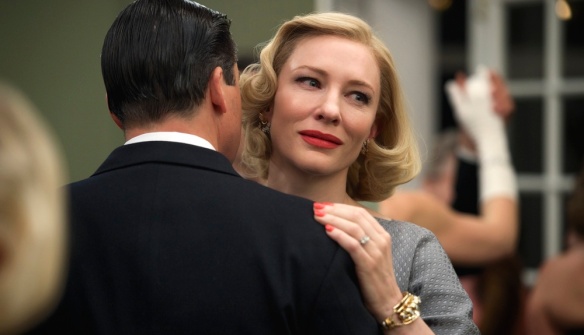 First thing’s first: Todd Haynes new film Carol is brilliantly acted, scripted and directed. I fully expect Oscar nominations for Cate Blanchett, Rooney Mara, and Haynes, as well as screenwriter Phyllis Nagy, adapting Patricia Highsmith’s novel The Price of Salt.
First thing’s first: Todd Haynes new film Carol is brilliantly acted, scripted and directed. I fully expect Oscar nominations for Cate Blanchett, Rooney Mara, and Haynes, as well as screenwriter Phyllis Nagy, adapting Patricia Highsmith’s novel The Price of Salt.
The plot concerns an unexpected love affair between two women in 1950s New York, wherein department store clerk Therese (Rooney Mara) meets well-to-do Carol (Cate Blanchett), whose marriage is on the rocks. Her husband (Kyle Chandler) discovers the affair, and embarks on a custody battle for their young daughter.
Revisiting themes present in Haynes earlier film Far From Heaven, which deliberately echoed Douglas Sirk 1950s melodramas, only with subject matter that would have been prohibited at the time, Carol is a much less self-aware piece. It isn’t trying to evoke Hollywood of yesteryear in quite the same way, though the 1950s atmosphere and attention to period detail are no less rigorous. Haynes opens his film with a shot of a ventilator grille, and frequently frames his subjects through glass, semi-obscured. This is a story about what is under the surface of the supposed American Golden Age.
Obviously, the subject of homosexuality is something Carol shares in common with Far From Heaven (which dealt in part with a husband desperately trying to “cure” himself of being gay), and it is here that some Christian audiences are likely to get hot under the dog-collar. Aside from obvious warnings about bad language and one quite strong sex scene, I want to make clear to fellow believers that had I thought this film to be a propaganda piece, grinding any kind of lobbyist axe, I would have duly pointed this out.
Instead, I felt Carol to be a profoundly subtle, understated, and above all human drama, dealing with very real feelings and situations which in the 1950s would have been difficult to cope with, to say the least. For example, it would have been easy to stereotype Chandler as a boorish villain, but here he is just as human as the romantic leads. Yes he is essentially an antagonist, but he is also a product of his time, genuinely bewildered at his situation, not deliberately evil.
One thing I cannot understand about many of my fellow believers is that they will condemn a film like this on subject matter grounds, yet enjoy a film like Doctor Zhivago or Brief Encounter. In fact, this film reminded me of the latter a great deal. This is a curious double standard. I for one enjoy both this and the afore-mentioned classics not because I endorse adultery (and yes, I am aware of what the Bible says about homosexuality), but because I am a human being with a soul.
I will conclude by simply reiterating that Carol is brilliantly acted, scripted and directed, and is quite rightly receiving a good deal of critical acclaim.







